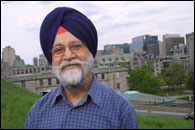Counting your blessings
As the roughly 5,000 students in black robes and mortarboards settle into their seats awaiting their hard-earned degrees, they will first need to sit through a number of speeches. The very first -- and very last -- thoughts they will hear at each of the nine convocations will be from one of McGill's chaplains.
 Sikh chaplain Manjit Singh
Sikh chaplain Manjit SinghPHOTO: Owen Egan |
|
"That might seem to be an unusual thing, but it has the power to shape the occasion," said Reverend Gwenda Wells, director of McGill's Chaplaincy Services.
"It's setting a moment in time outside of time, to be conscious that we are a part of a story that is bigger than ourselves."
McGill has been a secular institution since its founding and the chaplains who will be delivering the brief opening and closing blessings at the various convocations will respect that. They represent a wide variety of faith backgrounds, and the blessings they offer aim to be inclusive of the entire McGill community, regardless of their belief system.
"In Canada, the appropriateness of religion in public institutions is very much a part of our tradition. The presence of the blessing is the perpetuation of an important civic tradition," said Jewish chaplain Natalie Polzer, who will address the convocation for the Faculties of Arts and Religious Studies, where she taught for 10 years.
The opening prayer sets the tone of the rest of the ceremony, although it is only an address of a few lines.
"It's a very important occasion, and saying a prayer reminds them that we are not an end in ourselves, and there is a higher authority," said Manjit Singh, the Sikh chaplain who will attend the science convocation.
"The second [closing blessing] is the ending, that acknowledges that it's a major milestone, so it's a blessing and thankfulness. It's also neutral and inclusive of all faiths. By looking at it you can't tell it's from this tradition or that tradition," said Singh.
Although the chaplains will strive to avoid language that refers to specific religious traditions, all will be bringing their own perspective to their brief participation. Father Brian Boucher, who will address the Health Sciences convocation on May 23, appreciates the universality of the experience for the students and their families.
"As a Catholic priest what I see as beneficial is that regardless of whatever faith tradition the individual holds, we do have a commonality -- whether we realize it or not we're all linked."
Though her address will be all inclusive, Polzer said that it will definitely contain ideas that come from her faith background.
"We often think that blessed means holy or morally superior. That's not what it means in the Hebrew Bible; it means productive, successful, to be productive not only in substance but also in influence in the community, helping people," she said, adding that she hopes to include these themes in her blessing on June 17.
Just as Polzer will be performing her duties at the Arts and Religious Studies convocation because of her connection with that faculty, McGill's Muslim chaplain, Imam Salam Elmenyawi, will be delivering the blessings to law graduates, including his son. His message to the students will be tailored to their chosen profession, and acknowledging the uncertain global context in which they will practice their profession.
"Lawyers are a really important part of our society -- involved in law, politics and justice. The time we are passing through is a very special time, and we need more emphasis on justice and truth... I think this is [an important] message for lawyers to start their life with," said Elmenyawi.
Elmenyawi -- along with his colleagues -- feels that the tradition of having chaplains who represent different faiths and backgrounds only strengthens the sense of spirituality they try to convey at convocation.
"Having the different chaplains, Muslims, Christians, Jews, all doing the same function means that it is the message that is clear, rather than the messenger."

